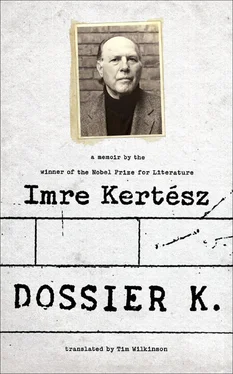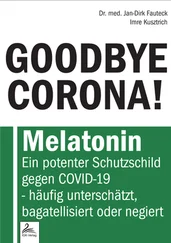It seems that already in childhood you were highly sensitized to words. In your most recent novel , Liquidation, you talk about the phobia you had about some words .
Yes, some nonsensical scheme was attached to language; the pronunciation of certain words elicited specific concepts, but that’s not what is meant in this case. Her grey two-piece suit and the red hat and the “Momsie”—for me all that elicited a horror for which I only later found a name; it was an apotheosis of the petit-bourgeoisie at which to this day I still shudder just the same way. However hard they tried, then, I stayed with the “Auntie Kate,” because that suited her, though she was a good deal younger than my mother. But let’s not get immersed in childhood memories; in the end you’ll want to see snaps of me in my infancy.
Just as you say, but let’s stay on the subject for the time being. I would be interested to know what your family was like, how your childhood was spent, and so on. You haven’t said anything about your father. A woman who was as interesting as you describe your mother to have been would certainly not have fallen in love with just anyone .
Eenie, meenie, minie, mo, falling in love. “What’s that?” Géza Ottlik has one of his characters ask in his novel Buda . At any rate, my father was in love, that’s for sure, and that was manifested most obviously in his frightful jealousy. My mother, by contrast, wanted to get out of the tight family home, her three sisters, her stepmother, and her father, and his struggles with his financial worries in the small place they had in Molnár Street in the Fifth, the inner-city district of Pest. At that time — and I’m talking about the 1920s — the road to freedom for girls usually lay through getting married. And through work, of course. My mother was just sixteen when she got a job with a firm working as a clerk, as they called it in those days.
You mean it was not a matter of marrying for love?
Look, it’s exceedingly difficult for a young child to judge his parents’ love life. Because I was their child, the relationship between the two of them took quite a toll on me.
Did they quarrel?
Not all that often, but when they did, like blazes. I have a recollection of a fine summer morning, for instance. By then we were living close to the City Park in the Fourteenth District of Pest, in a roomy and well-aired apartment — it may have been in Elemér Rod, though I don’t know if that’s still its name today. I must have been four or five years old; more likely five than four, as I have a clear memory of it. It was probably a Sunday, since both of them were at home. They were yelling at each other. What I picked out clearly was that it was about swimming baths: Father didn’t want Mother to go to the swimming baths. He probably suspected that Mother had a rendezvous with someone there. What wasn’t at all clear was why my father didn’t go to the swimming baths with my mother. On account of “the child,” I suppose — that was me. Suffice to say, Father snatched Mother’s white rubber swimming cap and ripped it to shreds. Mother, for her part, got hold of a huge pair of tailor’s shears and snipped two gashes in the front brim of Father’s hat. I can see to this day his look of astonishment at the floppy hat brim; it was a green felt hat. I screamed at the top of my voice. In the end, Mother went to the swimming pool and Father took me with him to the shops to buy a new hat. Which makes me think it was more likely on a Saturday, since the shops were not open on Sundays.
Do you have a lot of memories like that?
One or two.
But then they divorced later on .
Again it was me who got the short end of that. I was placed in a boys’ boarding school as a full boarder.
Is any trace of that boarding school recognizable in Kaddish for an Unborn Child?
I certainly went to some trouble on that score.
Is it something you don’t care to talk about?
On the contrary! One is always happy to think back to one’s childhood, however rotten and tough a period it may have been.
How far back can you trace your family tree?
That’s a good question, only it’s something that never really interested me. Well, however I scratch my head, I get stuck at my grandparents. As far as I know, my forebears were ordinary town-dwellers or, in some cases, peasants of assimilated Jewish background.
Peasants?
Why? Does that surprise you? My paternal grandfather may have been Jewish, but he was just a poor farm labourer. Until he committed himself to see the world. Family legend had it that he walked barefoot to Budapest from the village of Pacsa, near Keszthely, at the southern end of Lake Balaton. That would have been at the end of the nineteenth century, the time when many big careers were made. When he was strolling along what was then called Kerepesi (now Rákóczi) Avenue, his attention was caught by an elegant haberdashery, as they called those shops at the time. He took a huge fancy to the way the shop assistants were bustling around the customers and the counters, so without further ado he entered the shop, and within no time at all he was taken on as an assistant himself. His subsequent life shaped up in much the way that fairytale stories of those days regularly do. He married the youngest daughter of Mr. Hartmann, who was the proprietor of the shop (and I know nothing further than that about this great-grandfather), and before long he set up in business on his own account and opened a haberdashery himself. “A posh emporium on Rákóczi Avenue, with mirrors and chandeliers and seven shop assistants,” as family legend had it. By the time I got to know him, though, the poor chap was living in a bedsitter on Tömő Street in darkest Józsefváros, in the Eighth District.
Did he go bust?
In the First World War: he put all his money, his entire wealth, into war bonds. He was very patriotic …
You mention somewhere that he Hungarianized his family name .
Yes, my grandfather was originally called Klein, and he Hungarianized it even before the first world war. As to why he should have chosen Kertész, of all names, heaven knows. “Adolf Kertész, Haberdasher. No credit”—that’s what I remember a sign hung up in the shop said. But that shop was in Prater Street in Józsefváros, with only my grandfather and grandmother serving the clientele, who were mainly housemaids from the neighbourhood. “Young Ma’am” or “Little Missy” is how he addressed them, and in the days leading up to Christmas he would give them a pair of silk stockings as a present. He kept his Western Hungarian dialect to the end of his days, so I remember, for instance, he would use the word “underdrawers” instead of “underpants.” He never visited a doctor in his life, he never took a tram, and he didn’t wear a winter overcoat. I could tell stories about him for hours.
Go on, then. What did he look like?
He was a tall, gaunt man; not a spare ounce of flesh on him. He shaved his head bald. He would sometimes bend down his weatherbeaten and always stubbly face in front of me so I should give him a kiss. He was immoderately proud of the fact that he wore size 10 footwear. I always saw him in the same suit, winter or summer. There were times when he had to go round the wholesalers to stock up on wares. In those days the wholesalers had their warehouses on what was then Kaiser Wilhelm (nowadays Bajcsy-Zsilinszky) Avenue in the Fifth District. I recollect there were grey, frosty days when he would tell his wife, “I’m going into town.” As I said, he never took a tram or bus; he didn’t wear a hat; he would thrust his hands in the pockets of his grey jacket, keeping the thumb sticking out on either side, turn silently at the door, and vanish in a puff of his own breath like a wizard.
Читать дальше












